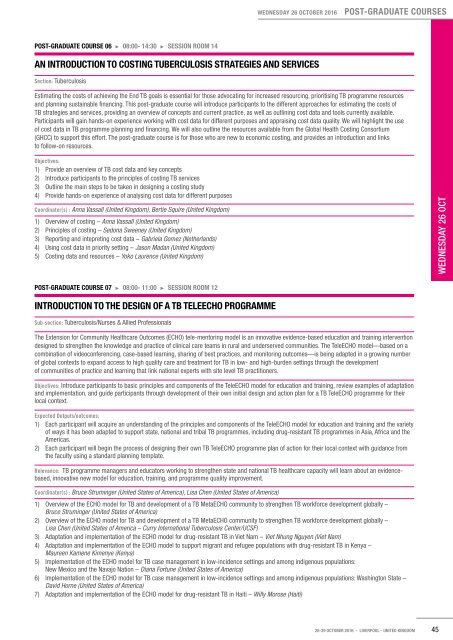TO INNOVATIONS
2f3gIP7
2f3gIP7
You also want an ePaper? Increase the reach of your titles
YUMPU automatically turns print PDFs into web optimized ePapers that Google loves.
WEDNESDAY 26 OC<strong>TO</strong>BER 2016 POST-GRADUATE COURSES<br />
POST-GRADUATE COURSE 06 3 08:00- 14:30 3 SESSION ROOM 14<br />
AN INTRODUCTION <strong>TO</strong> COSTING TUBERCULOSIS STRATEGIES AND SERVICES<br />
Section: Tuberculosis<br />
Estimating the costs of achieving the End TB goals is essential for those advocating for increased resourcing, prioritising TB programme resources<br />
and planning sustainable financing. This post-graduate course will introduce participants to the different approaches for estimating the costs of<br />
TB strategies and services, providing an overview of concepts and current practice, as well as outlining cost data and tools currently available.<br />
Participants will gain hands-on experience working with cost data for different purposes and appraising cost data quality. We will highlight the use<br />
of cost data in TB programme planning and financing. We will also outline the resources available from the Global Health Costing Consortium<br />
(GHCC) to support this effort. The post-graduate course is for those who are new to economic costing, and provides an introduction and links<br />
to follow-on resources.<br />
Objectives:<br />
1) Provide an overview of TB cost data and key concepts<br />
2) Introduce participants to the principles of costing TB services<br />
3) Outline the main steps to be taken in designing a costing study<br />
4) Provide hands-on experience of analysing cost data for different purposes<br />
Coordinator(s) : Anna Vassall (United Kingdom), Bertie Squire (United Kingdom)<br />
1) Overview of costing – Anna Vassall (United Kingdom)<br />
2) Principles of costing – Sedona Sweeney (United Kingdom)<br />
3) Reporting and intepreting cost data – Gabriela Gomez (Netherlands)<br />
4) Using cost data in priority setting – Jason Madan (United Kingdom)<br />
5) Costing data and resources – Yoko Laurence (United Kingdom)<br />
WEDNESDAY 26 OCT<br />
POST-GRADUATE COURSE 07 3 08:00- 11:00 3 SESSION ROOM 12<br />
INTRODUCTION <strong>TO</strong> THE DESIGN OF A TB TELEECHO PROGRAMME<br />
Sub-section: Tuberculosis/Nurses & Allied Professionals<br />
The Extension for Community Healthcare Outcomes (ECHO) tele-mentoring model is an innovative evidence-based education and training intervention<br />
designed to strengthen the knowledge and practice of clinical care teams in rural and underserved communities. The TeleECHO model—based on a<br />
combination of videoconferencing, case-based learning, sharing of best practices, and monitoring outcomes—is being adapted in a growing number<br />
of global contexts to expand access to high quality care and treatment for TB in low- and high-burden settings through the development<br />
of communities of practice and learning that link national experts with site level TB practitioners.<br />
Objectives: Introduce participants to basic principles and components of the TeleECHO model for education and training, review examples of adaptation<br />
and implementation, and guide participants through development of their own initial design and action plan for a TB TeleECHO programme for their<br />
local context.<br />
Expected Outputs/outcomes:<br />
1) Each participant will acquire an understanding of the principles and components of the TeleECHO model for education and training and the variety<br />
of ways it has been adapted to support state, national and tribal TB programmes, including drug-resistant TB programmes in Asia, Africa and the<br />
Americas.<br />
2) Each participant will begin the process of designing their own TB TeleECHO programme plan of action for their local context with guidance from<br />
the faculty using a standard planning template.<br />
Relevance: TB programme managers and educators working to strengthen state and national TB healthcare capacity will learn about an evidencebased,<br />
innovative new model for education, training, and programme quality improvement.<br />
Coordinator(s) : Bruce Struminger (United States of America), Lisa Chen (United States of America)<br />
1) Overview of the ECHO model for TB and development of a TB MetaECHO community to strengthen TB workforce development globally –<br />
Bruce Struminger (United States of America)<br />
2) Overview of the ECHO model for TB and development of a TB MetaECHO community to strengthen TB workforce development globally –<br />
Lisa Chen (United States of America – Curry International Tuberculosis Center/UCSF)<br />
3) Adaptation and implementation of the ECHO model for drug-resistant TB in Viet Nam – Viet Nhung Nguyen (Viet Nam)<br />
4) Adaptation and implementation of the ECHO model to support migrant and refugee populations with drug-resistant TB in Kenya –<br />
Maureen Kamene Kimenye (Kenya)<br />
5) Implementation of the ECHO model for TB case management in low-incidence settings and among indigenous populations:<br />
New Mexico and the Navajo Nation – Diana Fortune (United States of America)<br />
6) Implementation of the ECHO model for TB case management in low-incidence settings and among indigenous populations: Washington State –<br />
David Horne (United States of America)<br />
7) Adaptation and implementation of the ECHO model for drug-resistant TB in Haiti – Willy Morose (Haiti)<br />
26-29 OC<strong>TO</strong>BER 2016 - LIVERPOOL - UNITED KINGDOM<br />
45


